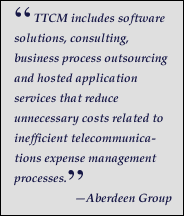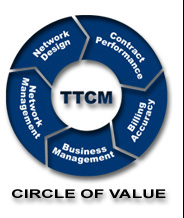




TTCM Savings Area:
Network Performance
Published In: Volume
3 Issue 4
Date: September,
2004
|
As Yogi Berra once said, "It's déjà vu all over again!" After all, wasn't it only about a dozen or so years ago that the arrival of Frame Relay and all its promises caused us to ask whether Private Lines would survive? Well, if history
repeats itself we can expect Frame Relay to be around for some time
to come. But will history repeat itself this time, or will Frame
Relay exit the scene swiftly? Most traditional network providers
are currently offing a relatively new technology, Multi Protocol
Label Switching (MPLS) that is giving Frame Relay a good run for
its money.
Like Frame Relay, MPLS is a virtual networking protocol that allows companies to connect offices via a "network cloud". Unlike Frame Relay, MPLS is based on IP routing at the packet level (layer 3), as opposed to the frame level (layer 2). In addition to routing enhancements, packets from various applications are uniquely identified, offering the ability to define rules and priorities as to how they are processed within the network. Most Frame Relay networks could easily be replaced by an MPLS network and with minimal changes to customer-owned equipment.
MPLS offers many benefits over Frame Relay, which is why we see companies making a rapid transition to this new offering. While price is not yet the defining element, it is growing in importance as cost go down quickly. Here are the key benefits we see to MPLS:
Unfortunately for Frame Relay, MPLS isn't the only predator around. Many providers, particularly the ones who never built large Frame/ATM networks, are offering "pure" IP networks. These networks, which break away from the constraints of standard Time Division Multiplexing are in many cases capable of speeds up to 1 Gig delivered directly to a customers Etherswitch or Router via an optical interface. So will Frame Relay survive? Probably, but mostly for Hub and Spoke networks with small bandwidth requirements. And as far as history repeating itself one more time, look for my article entitled " Will MPLS and IP Survive?" just a few more years down the road…
©2004,
TelAssess, Inc. All rights reserved. |
![]()
©2004, TelAssess 800.657.1595
Designed by Stylus
Designs
